Celebrations play a significant role in community life, and even 4th of July safety becomes part of the holiday experience. With fireworks, cookouts, pool parties, and extreme heat, associations must stay alert and prepared. Every HOA should include safety planning in its event preparations. A few clear reminders help keep festivities enjoyable and injury-free.
Most Important 4th of July Safety Tips
Fourth of July safety tips address the most significant risks associated with summer celebrations. Fire, heat, water, and loud noise all need extra attention. When boards take the lead, communities can celebrate safely and confidently.
Here are the most essential safety tips for Independence Day.
1. Fireworks Safety 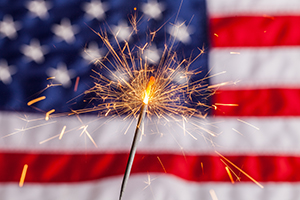
Fireworks often mark the holiday, but they pose serious risks. More than 19,000 fires stem from fireworks every year. Local laws regulate 4th of July fire safety, and many areas ban fireworks entirely. Boards should confirm what’s allowed and share those rules with the community.
When fireworks are permitted, the following safety tips should be kept in mind:
- Boards should name specific zones for safe use.
- Adults must take full responsibility for their own lighting.
- Children should never hold or ignite fireworks.
- Direct fireworks away from people, pets, and property to reduce the risk of harm.
- Residents should light one device at a time and never attempt to relight a dud.
- Keep water buckets or hoses nearby to put out any unexpected flames.
- Never use fireworks indoors or near dry grass.
- Encourage residents to wear eye protection when working with lighting.
- Soak used fireworks in water before disposing of them.
- Promote alternatives like glow sticks or confetti poppers as safer crowd-pleasers.
Sparklers appear innocent, but they burn at extremely high temperatures. Young children face high risks of burns. As an alternative, associations can encourage the use of glow bracelets, LED wands, or streamers instead.
2. Water and Pool Safety 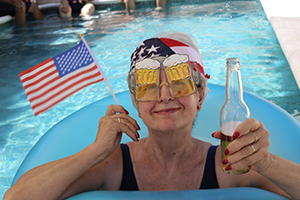
Pools offer relief from the summer heat, but 4th of July safety depends on active monitoring. Boards should post pool rules clearly and consistently. Here are some safety tips for water and pool use:
- Supervising adults must watch children closely at all times.
- No flotation device can replace the presence of an alert adult.
- At larger gatherings, assign one adult per group of children to ensure coverage.
- Discourage swimming under the influence of alcohol.
- Hire lifeguards or CPR-trained volunteers to add an extra layer of protection.
- If the community plans water games like slip-and-slides, set up away from hard surfaces.
- Avoid playing with running water near sidewalks or driveways.
- Keep a stocked first aid kit within easy reach of the pool area.
- Communities near lakes or rivers should emphasize safe boating practices.
- Boaters must carry enough life jackets for every passenger and avoid drinking alcohol while operating a vessel.
3. Grilling Safety 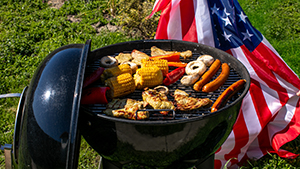
Grills bring people together, but they also spark the majority of holiday fires. To counteract this, the board should share 4th of July safety reminders when it comes to grilling. Here are the most crucial grilling safety tips:
- Position grills at least two feet away from siding, trees, fences, or decorations.
- Check propane hoses for cracks and ensure all equipment functions properly.
- Only use grills outdoors and never cook in enclosed areas, such as garages or under awnings.
- Children and pets should stay at least three feet from grills at all times.
- Remind grillers to turn off propane and adequately dispose of charcoal once cooking ends.
- Keep fire extinguishers nearby to help prevent emergencies.
- Remind residents never to leave grills unattended, especially when food is cooking or coals are hot.
- Suggest placing grills on level surfaces away from foot traffic to reduce the risk of tipping.
4. Heat Safety 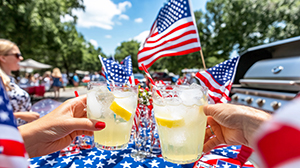
July weather brings serious health risks, and 4th of July safety depends on how residents manage high temperatures. To promote heat safety, keep the following tips in mind:
- Encourage regular hydration.
- Drink water throughout the day and limit your intake of sugary and alcoholic beverages.
- Encourage wearing light-colored clothing and using sunscreen.
- Host events in the morning or evening to avoid the midday sun.
- Offer shaded seating, fans, or misters.
- Cooling stations stocked with water can help lower body temperatures fast.
- Check on vulnerable residents, including older adults and those without air conditioning.
- Remind everyone to never leave a person or pet in a parked car, even for a brief moment.
If the area lacks reliable access to air conditioning, suggest that residents visit cooling centers, libraries, or community centers during peak heat hours. Distribute flyers in advance to ensure everyone knows where to go.
5. Kid Safety 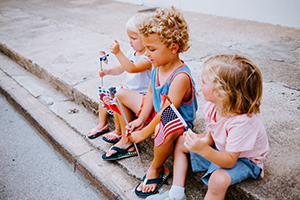
Children need active supervision and safe spaces to enjoy the day. To ensure July 4 safety for children, boards should take proactive steps and educate residents.
- Provide family zones away from grills and fireworks, with games, crafts, or relay races.
- Offer a quiet area with shade and seating helps prevent overstimulation.
- Fireworks often exceed 150 decibels, which can cause permanent hearing damage. Recommend earplugs or headphones to protect children’s ears.
- Make sunscreen and bug repellent available at outdoor events.
- Remind families to bring extra clothing, snacks, and reusable water bottles for kids.
Teens driving during the holiday should stay cautious. Holiday weekends see a spike in impaired driving. Boards can work with parents to send out timely reminders about safe driving and curfews.
6. Pet Safety 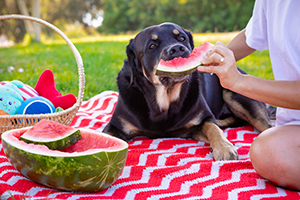
Pets often struggle with loud sounds and crowds. For 4th of July safety, residents should plan for animals that may panic or escape.
- Keep pets indoors and create calm environments with soft background noise.
- Update your pet’s tags and microchip before the holiday.
- Encourage early exercise so pets feel calmer in the evening.
- For residents planning to be away, it is recommended to hire a pet sitter.
- Remind residents to provide shade and water during outdoor events.
- Post signs at event entrances to remind attendees to keep their pets leashed and owners responsible.
- Boards should also be aware of signs of heat stress in animals and direct owners to act quickly if their pets exhibit any symptoms.
- Consider providing pet-friendly spaces at events with water bowls, cooling mats, and shaded spots.
- Inform pet owners about the available accommodations before the event begins.
A Safe Holiday for Everyone
Every HOA can protect its residents with careful planning. Promoting 4th of July safety will help prevent injuries, fires, and lost pets. Boards can create a safe space where everyone can celebrate together by sending out these reminders and taking proactive measures.
RELATED ARTICLES:
- HOA Flag Display: When Should It Be Allowed And Prohibited?
- Going On A Picnic? Try These Fourth Of July Picnic Food Ideas And Recipes
- Preparing for the Freeze: HOA Winter Maintenance Strategies







